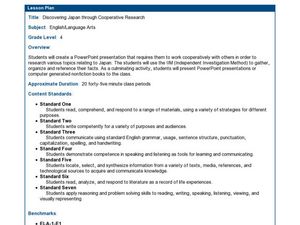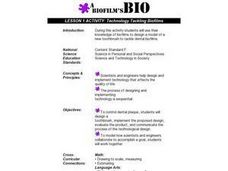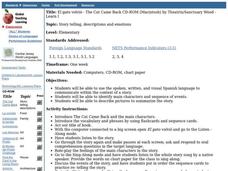Curated OER
Poetry As Oral Performance
Reciting poetry is a great way to build oral language skills and build classroom community. Pupils look at the text elements of poetry and choose a poem to read aloud. They focus on rhythm, fluency, and expression. This is a great way to...
Curated OER
Treasure Tales
Create an artifact kit to engage your young learners. Then, assign small groups a section of chapter three. They will identify the main idea and three supporting details for their section. Then, they select one artifact from the kit that...
Centre for Clinical Interventions
Social Skills Treatment Programme
Even though they may not be tested on standardized assessments, social skills are vital for students to develop during their years in school. Through a series of discussions, activities, and role-playing exercises, these lessons teach...
Curated OER
What's Your Favorite Food?
Advanced beginner to intermediate ESL level learners, use English to communicate in social settings by conducting a survey. They ask questions to develop new vocabulary and build communication skills.
Curated OER
Identify Intended Media Messages
How does media convey different messages? Use this lesson to explore media by identifying and analyzing selected images. Middle schoolers analyze a poster and discuss the intended meaning of the imagery and how it makes them feel. They...
Curated OER
Discovering Japan Through Cooperative Research
Search a variety of sources to create a multimedia or book project about Japan. Learners use the independent investigation method to plan and conduct research about Japan. They use the information they discover to create a computer book...
Curated OER
Building an Underwater Habitat
Students investigate underwater habitats. In this underwater habitat lesson, students study Aquarius and design their own underwater habitat that can sustain life. Students work in groups and present their habitats to the class. Students...
Curated OER
Become an Expert
Students are assigned a separate species of plant or bird to research. Using a worksheet, they are responsible for finding a variety of information on their assigned plant or bird. They also complete a mini-poster and give an oral...
Curated OER
Mi Mochila (My Backpack)
Here is a way to practice using Spanish vocabulary about school. This exercise offers real-life examples of school items, oral practice, and ideas for working in pairs. Note: Using real-life examples is a great strategy in teaching a...
Curated OER
Technology Tackling Biofilms
Students use their knowledge of biofilms to design a model of a new toothbrush to tackle dental biofilms. In addition, they evaluate the product, and communicate the process of the technological design.
Curated OER
Mathematical Magazines
Students classify and tabulate the type of advertisements found in a collection of magazines. Determination is made on what percent of the total number of ads each type represents. They present their results orally and in a graph.
Curated OER
Fabulous Felines
Young scholars learn how cats communicate with humans. For this non verbal communication lesson, students learn how cats communicate with humans. Young scholars discuss how they communicate their thoughts and feelings and the differences...
Curated OER
Communication and Social Networks
Pupils work in cooperative groups to explore communication needs of our world. They are assigned a demographic area and asked to create ways to solve communication problems with innovative ideas. They also explore areas that can help...
Curated OER
Creating a Consumer-Awareness Information Campaign
Young scholars work across grade levels to research and design a community awareness campaign on the benefits of purchasing fair trade chocolate. They develop print advertisements, conduct research, write letters, make posters and...
Curated OER
Twisting Versions of Little Red Riding Hood
Students read orally two versions of Little Red Riding Hood (Classic and Cajun) They compare and contrast the two Little Red Riding Hood versions. Students create a concept map to demonstrate the comparisons/contrasts. They could also...
Core Knowledge Foundation
Rocks & Minerals
Take young geologists on an exploration of the rock cycle with this six-lesson earth science unit on rocks and minerals. Through a series of discussions, demonstrations, and hands-on investigations your class will learn about the...
Curated OER
Poetry
Fifth graders preview different poetry selections form different poets to narrow their criteria for a favorite poem. They use the web and written sources to find a favorite poem and then give an oral interpretation of their poem in class...
Curated OER
Time in a Teakettle
Students compare and contrast the development of teakettles. In this artifacts lesson, students divide into groups and examine different teakettles. Students complete an artifact analysis worksheet, draw a picture of their kettle and...
Curated OER
Transformations
Students identify the types of transformations in their lives. As a class, they determine the ones they have control over and which ones they do not. They practice solving problems in math and oral communication that they are faced with...
Curated OER
Black History Month
Learners work in cooperative pairs to research information and give oral presentations about African American men and women who have made significant contributions to U.S. history.
Curated OER
Not Everything is More Expensive
Young scholars explore percent increases and decreases. They calculate the percent increase and decrease. Students use math to solve problems and communicate. They apply the given formula for percent increase/decrease.
Curated OER
I Hate English!
Students listen to quality literature, examine the Chinese culture, and participate in an oral activity.
Curated OER
The Cat Came Back
Students are read the story "The Cat Came Back". Using Spanish, they communicate the context of the story with each other. They practice using new vocabulary, identifying main characters and putting the events into order. They use the...
Curated OER
Research Project
Pupils research a given topic and organize information in order to write a report or make an oral presentation. They design and create a visual aid (poster, model, PowerPoint, etc) to help clarify the concepts of their report/presentation.

























